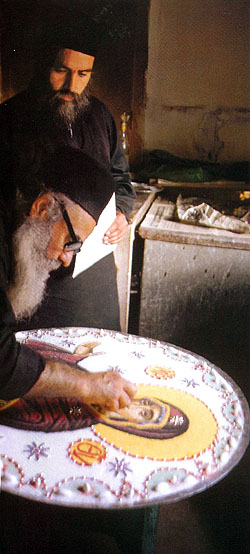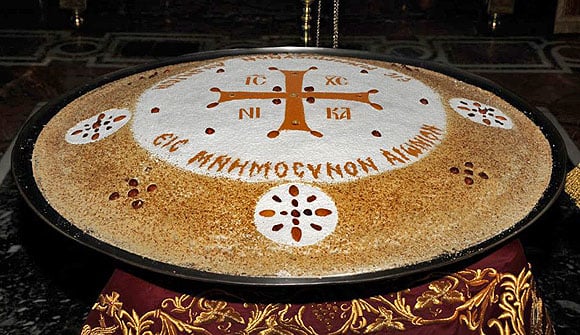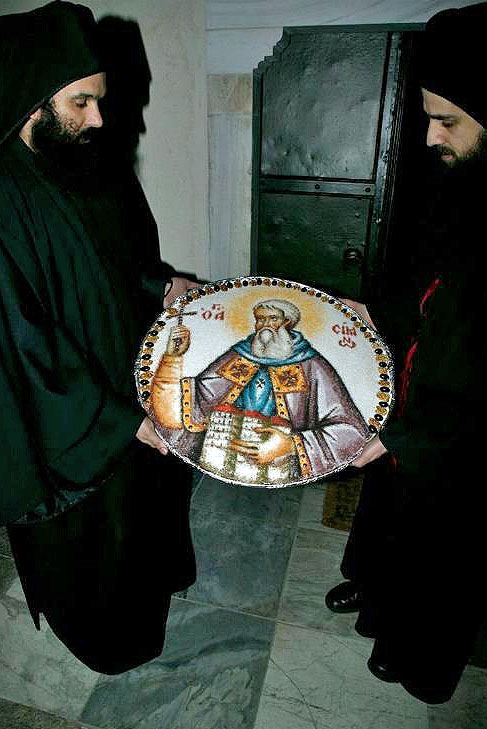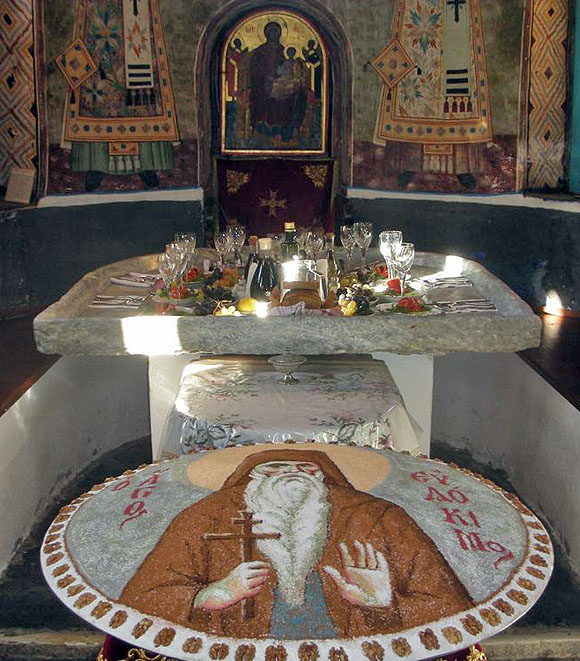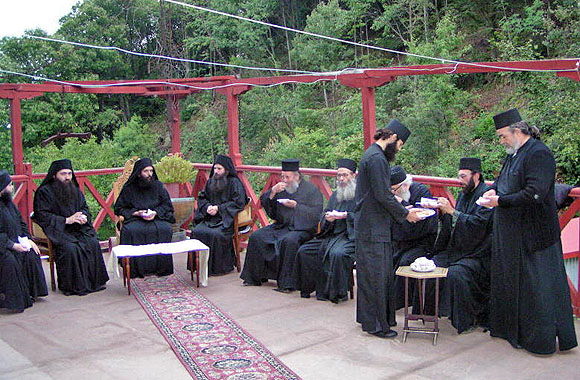
Life gets busy and we don’t step back enough to see what we might be doing as parents to hurt our children’s spiritual growth. Being an intentional Orthodox Christian parent is hard work…but it’s worth it. We have a legacy of faith, wisdom and experience we can pass on to our kids if we pay attention. But if we don’t—we could cause more harm than good.
1. Buying them smartphones. People look at us like we’re freaks, but my husband and I refuse to buy smartphones for our kids. Not only are they expensive, but they allow unsupervised access to the internet, among many other faults. Some parents trick themselves into believing their kids will use internet on their smartphones for “educational” purposes. Yeah right. Don’t fool yourself. The internet, like the TV, is the devil’s playground when it’s not properly supervised. Your job as a parent is to protect your child’s innocence as long as possible. There’s a whole lot of nasty garbage out there that puts thoughts and ideas into their heads that they don’t need. Right now, their souls are like flowers just barely beginning to bloom. Don’t kill that spiritual growth with the world’s evils. And texting? Really, why do kids need texting? Have you looked around lately at all the kids glued to their phones because they’re so hooked on them they can’t put them down. Geez, don’t assist them in losing their childhood. Let kids be kids. Unplug them now because they don’t know how and they need your help.
2. Unsupervised computer use without parental controls. As with smartphones, the internet is full of temptations kids don’t have the ability to deal with. Statistics show the average nine year old has already been exposed to porn on the net.
Do not put a computer in their room. And if there already is one in there, take it out and put it in a prominent area of your home. Seriously, this is their innocence and their soul we’re talking about here. Our kids work on the computer in our family room where the screen is in our view. They can’t log in without our passwords, and we also have them keep to a two-hour computer time limit (which the American Academy of Pediatrics recommends) with breaks in between. Then, we send them outside to get fresh air and to do what kids are supposed to do—play.
3. Encouraging dating in early teen years. We’re pushing off dating as long as possible. Why? I don’t believe putting kids in tempting situations is good for them. Just because you may have dated at an early age and survived doesn’t mean they will. STD’s are at an all-time high. Early intimate relationships also increase risk of depression and suicide. They are still growing and learning about life. Doing things adults do in relationships is not only dangerous, but it’s a heck of an emotional load to put on a kid. They’ve got enough to worry about with homework, sports and college. You might think it’s cute, but when your child ends up telling you they’re pregnant or they have Herpes—it’s not so cute.
4. Being lax about prayer and going to church. In a world where the word religion is looked at as a bad word, and kids are being told rules don’t matter anymore—church is desperately needed. We do not pray enough. Our kids need to see us pray, and they need to see us make church a priority. And what if they tell you they don’t want to go? Go anyway. You’re the parent. Kids need structure, and they need to see you as an example of someone who strives to put God first, before everything else.
5. Not talking about the issues they face. Just because they act like everything is okay doesn’t mean it is. It’s crucial to connect with your kids every day. Show you care by asking about their day and actually listening to them. Take them out for dessert or to a coffee shop for one-on-one time. Ask their opinion on things with school, their teachers, friends, church—whatever. Help them by offering a non-judgmental, loving example of the Church’s viewpoint on current issues. Kids are confused today because the world is telling them so many things are okay that the church is saying are not. You can be the voice of reason and sanity for them, and by showing them respect and listening—they’re more likely to hear you.
6. Paganizing Christianity. Some things just aren’t Christian, no matter how you try to make them that way. While it’s great to have healthier alternatives, we can’t Christianize everything. Sadly, public school dances in many schools have now become a showcase of blatant immorality. My jaw almost dropped to the floor when my teenage daughter told me her junior high school’s dance last year included lap dancing and pole dancing. Then she mentioned later that “grinding” was rampant, and the punch got spiked. Huh? Yes, that’s right. Because the parent chaperones were afraid to say something, the kids got away with it. Throw in oversexualized lyrics, peer pressure, hormones and brains that haven’t grown completely—and you get a recipe for disaster. Come up with your own ways to celebrate that don’t include being immoral. This year, to substitute for a school dance, we’re looking at renting a boat and having our kids invite a friend to come along. We don’t mind spending a little money to give our kids a fun time with friends. Why waste a miserable night chaperoning a dance when our kids could have a better, cleaner time doing something fun with friends?
7. Too much freedom. It blows me away how many parents don’t know where their kids are these days. First of all, friends are important, but it’s the family that sticks around for the long haul. Parents should not feel embarrassed to require their kids to be home for dinner and to know their whereabouts. And no, I don’t drop my kids off at the mall. What good things happen at the mall anyway? Involve them in church youth groups and volunteer organizations and sports, but be careful how much time they spend wandering aimlessly with friends who might not always be the best influence. Don’t let them back you in a corner. It’s okay to put your foot down and say no on some of their activities. As long as they know you love and respect them, they will eventually understand ( it might be when they’re 30, but they will thank you later).
8. Ignoring the value of hard work. Do your kids do regular chores? If not, why not? You are robbing them of valuable opportunities that will raise their self-esteem and help them learn skills they will use all their life. Aside from that, they live in your house, and you are not a maid. Enough said.
9. Not teaching them manners. The other day, two teenage boys walked into a door in front of me and let the door swing back in my face. They just kept talking and didn’t even look back. I can hold a door open myself just fine, but I think it’s a good thing to teach teen boys and girls to look out for the person behind them. Teach them to say excuse me when they bump into someone or walk in front of them. Kids today could really use a lesson in manners. You will do the world a lot of good to teach them to respect and honor others like our faith teaches.
10. Money doesn’t grow on trees. One day, they will be on their own and will need to know how to pay bills. Teach them at an early age that doing work is how they get money. Have them do jobs to earn their spending money. Teach them to tithe 10% to charity, like the Bible teaches, and show them how to invest. Proverbs has a lot of great verses to show kids the importance of being wise with finances and planning ahead. There is a time to give money to kids, but be careful. Many kids are getting money way too easily, without understanding its value.
There isn’t a blueprint out there for how to raise morally aware kids, in an increasingly immoral world. But there is hope. We have more power than we realize.
Remembering that we have the church to guide us, and Orthodox Christian friends and family who are going through the same thing, helps.
It’s so important that we do the hard things sometimes, and step up to the plate. Our kids need us to be strong and guide them to the right thing.
http://myocn.net/10-ways-orthodox-parents-set-children-up-for-moral-failure/

